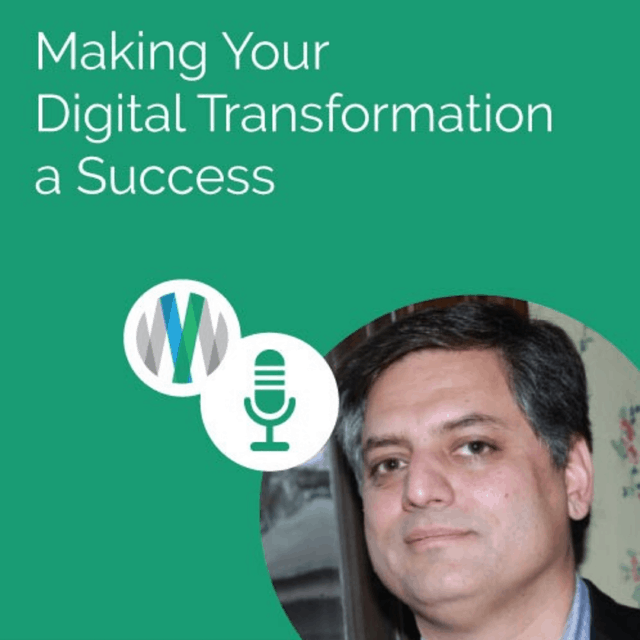Mike Boyle:
How much of an impact does business change management play in successful digital transformation projects?
Ali Davachi:
It’s huge. I think you have to have a proper change management process in place because you’re not just changing a system. I think that’s one of the fallacies in digital transformation or technical transformation of any sort. You just don’t install a new piece of software and expect everything to just be okay the next day. You have to track all the risks involved in that. That’s where your change management process comes in place; managing your human capital, managing your actual capital, managing your processes and making sure you’re mapping them not just to the changes that the application or upgrade or change will have, but also to the outcomes that you’re trying to deliver. Change management is a critical component in that process.
Mike Boyle:
My next two questions I really feel are most important when people are considering a digital transformation project. Let’s talk about mindset. How do we change the mindset of most organizations to make sure that business outcomes are the key drivers for all their IT and digital transformation projects?
Ali Davachi:
That’s a great question, and it’s one that I come up against a lot. It has to start at the top, frankly. You really have to change. It starts at the top of both the IT organization, as well as the general management of the organization. You have to look at everything you do in your business as having a customer impact.
I think a lot of times what happens is, and what we’ve seen is that the technology side of the business tends to be decoupled from the value it provides to the business, which then provides value to the customer. If you start looking at every part of your business from a customer service through technical implementations as what value is this allowing us to provide to our client base to our customers. Why does that customer interact with us versus somebody else? They have lots of choices and there’s nobody who has a monopoly anymore. Even when we think about the big tech companies, they really don’t have. There’s alternatives that are available to even those organizations.
The mindset at the C-level has to be that we are customer-driven. We want to understand what our customers really want, not in the language of what we want, but in their own language, and then translate that and communicate, communicate, communicate throughout the entire organization, why it is we do what we do, how we do it, and what is the value that we’re delivering to the customer. That has to start at the top. You can’t start a PowerPoint here and … it’s got to be the consistent messaging throughout the entire organization so that you don’t have a mismatch in why people think they’re doing what they’re doing.
That’s a hard shift. So if you’re not in that mindset today, that’s where you to start in my mind for a successful change of any sort in your business, because in general people at all levels, regardless of whether they’re a C-level, or a general manager, or a team lead, or a team member, change is hard. They’re used to doing things a certain way. They’re used to seeing positive outcomes, possibly in that way, probably in that way, and making them change what they do, creates a burden on them, and they need to have clear understanding. So it’s transparency, it’s communication, and it’s focus, all of those things around the customer, and then how you translate that into your internal processes absolutely critical in starting that mindset shift.
Mike Boyle:
Okay, so that’s mindset. Let’s talk about company culture, which is a little bit different animal there. How important is company culture for a digital transformation to be considered as a business success?
Ali Davachi:
I think it goes hand in hand. You really can’t do anything successfully in a business if you don’t have a culture that supports change and supports an open dialogue at all levels. If you’re a hierarchical culture top-down, that’s when you’re going to see the most resistance to any change, because the general organization doesn’t feel like they had input into the process. They don’t feel that their consideration or their understanding, or again, the transparency and the communications required to successfully implement these things has been taken into account.
In my mind, culture is a number one thing that you have to manage, and you have to support, and you have to cultivate in order to have a flexible business that can adopt these changes as consumer patterns and customer patterns change. Customers change on a dime. If your culture is rigid and structured and doesn’t allow for that flexibility or that feedback to come from the folks that are facing the customer quickly, and then for it to be analyzed and executed upon, well then you’re going to fall behind.
One of the things that I tend to tell new clients that I’m working with, particularly if they’re already in trouble, is if you’re not growing at some level, you’re on a glide path to failure. There is no steady state in business. You might think there is, but someone’s out there taking your new customers or eating away at your share. So you have to be able to be flexible from that perspective, flexible from a mindset perspective, which then drives flexibility and an overall culture perspective.
Mike Boyle:
I know this is something that you like to talk about. I’m speaking about the philosophy of business outcome-based digital transformations. Can you talk about what that is and the philosophy behind it?
Ali Davachi:
The word outcome means a lot of things. People can use the word goals. They can use the word milestones if it’s a project, but ultimately what I feel is the keystone let’s say, of a successful project or build out is understanding what the outcomes are. Not why, but what. So what are you trying to accomplish? What is the business objective for this particular project, whether it be a transformation or any project? It doesn’t have to be one thing. It could be several things that you’re trying to accomplish.
But focusing on that outcome and then mapping your outcome to your customer’s desired outcomes is a very critical piece of the puzzle, because if you build a project to do, let’s say improve productivity, okay, that’s pretty typical what the consultants will come in and say, you need to do, well why? What is the benefit of that? What can you do more for the customer? Are you driving more value to the customer by doing that? Are you giving them less risk by doing that? What is that? And then the outcome you’re driving to the customer, how does that map to the outcome you’re driving internally, and how do you communicate that to your staff that’s responsible for delivering that outcome and executing and providing that. It all comes down in the end to communications and transparency, which for me, if you drive outcomes and you focus on outcomes, you’re going to have better engagement, you’re going to have better accountability, and you’re going to have better trust within your organization, which then also feeds back into the culture and the mindset.
So it’s really super easy in my mind to define those outcomes in the language of the customer and the language of the business, map them together and provide them to your team at a very transparent level so that everyone is really understanding why it is they’re doing what they’re doing. There’s no ambiguity. That’s key to our outcome-driven approach to everything that we do here.
Mike Boyle:
So, let’s say I have a business that’s running a legacy system. What kind of insight would you offer to me? How would you go about guiding me on whether or not I should consider a digital transformation project?
Ali Davachi:
First I would say, I don’t really like the word legacy, because the way I look at things is my first question would be, what do you do for your customers? Why do they pay you every day to interact with you? Once we define that, then I want to look back at internally. What are you doing internally that is supporting that? What processes, what products, et cetera? And then if this legacy system is still delivering those services to the customer and you are continuing to grow and it’s meeting your business requirements, then this is why I don’t like the term legacy, just because technology isn’t the greatest, newest thing doesn’t mean it’s not actually still the right answer for your business and for your situation.
The digital transformation component starts to come into play when you start talking to me about your customers and their patterns changing, their interaction patterns changing, their desire to be, let’s say more asynchronous or more self-service, or maybe they want to reduce costs and have a better integration with you. Then we need to have the discussion around that systems or systems and say, can those things be extended? Can we wrap them in a way that makes sense so that you minimize your expense and your risk in implementing these services, but still meet the requirements? And if all those answers are no, then we started looking at a legacy platform and say, “Okay, where could we go understanding that we want to have capital reserved for customer facing and customer direct implementations versus internal technical implementations, as much as possible, how do we implement something that would solve the legacy problem and give your clients, customers the types of interactions and integrations they want to work with you and continue to work with you and hopefully grow working with you?”
Mike Boyle:
All right. We’ve talked about company mindset. We’ve talked about company culture. We’ve talked about a way to look at attacking your digital transformation project. In summation, last question, could you give me four or five of the most important things that you think companies need to consider so that they make sure that their digital transformation project is a success?
Ali Davachi:
Sure. Four or five. I think the first five would be outcomes. Number two, let’s say transparency. Be completely transparent, both internally and externally. Communicate with your customers. Let them know what you’re doing, why you’re doing it. Let the internal folks know what they’re doing, why you’re doing it. Clear communications around all the steps that are going to be required, all the changes that are going to be required. Like you mentioned, change management; it’s really critical that everyone understands as the project starts, that they’re going to have an impact. It shouldn’t be a surprise three months down that some department is now impacted. You should really think through all of those things ahead of time, through your change management process.
Risk; really, really focus on risk. What are the areas where even if you have a successful implementation and everything goes well on the technical side, where are the risk factors? Where’s the human risk factors? Training, adoption, convincing people that it’s the right choice to move forward.
The last one I would say is start easy. Don’t try to solve the big problems first start with the easy problems, the low hanging fruit, as people say, because you start to build that trust. You’ll get more goodwill when they see positive outcomes from the project, and then you can gain momentum there. And that momentum will serve you when you hit some rough spots. It’ll help you get through those rough spots that you’ll inevitably have. Look for the smaller bits that you can go after that can give some benefit to the clients, give some benefit to your internal teams and then go after the bigger items in your transformation. That’s a really important piece I think, to grow that trust.
Mike Boyle:
Couldn’t agree more.
Ali, this has really been informative, and I want to thank you for joining us today and sharing all this expertise about making digital transformation projects a success. Thanks.
Ali Davachi:
Thanks, Mike.
Mike Boyle:
If you would like to learn more about Ali’s company, Realware, just visit realware, R-E-A-L-W-A-R-E, .com. Ad Victoriam has some great free resources about digital transformation, and I’ll put some links to those resources in this show’s notes, so be looking for that. Lastly, if this is the first time you’re listening to our Ad Victoriam Salesforce Simplified podcast, and you like what you heard, make sure you follow us. We’re on all of the podcast channels, and we’re also now on YouTube as well. Just search for Ad Victoriam Solutions.
I’m Mike Boyle from Ad Victoriam. Thank you for joining us for this Salesforce Simplified podcast. Our next episode is just around the corner.


